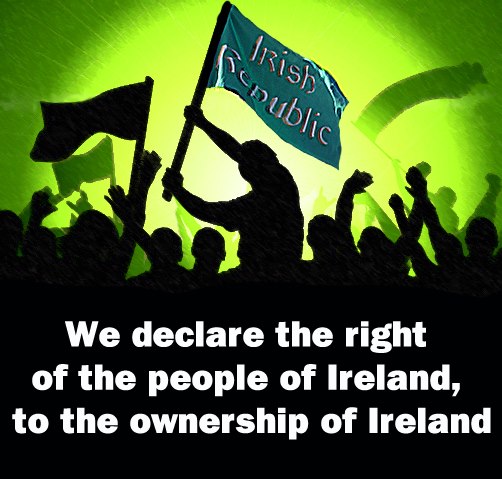Jim Slaven see's Sinn Fein's withdrawal of support for the Tory Welfare Reform Bill it had previously supported, as electioneering. Jim Slaven is an activist, writer and member of the 1916 Societies. He tweets @JimSlaven - the article appeared on 107 Cowgate
 |
The announcement that Sinn Fein will not now after all support the Welfare Bill[i] going through Stormont has, we are told, plunged the political institutions into yet another ‘crisis’. To be fair it’s the only decision they could have taken. Although it doesn’t take a great deal of cynicism to see this move as electioneering on the part of the nationalist party. With the Westminster election only weeks away and the Free State on an election footing the party faced certain difficulties selling their message. The sort of difficulties a lack of consistency invites. Trying to sell yourself as an anti-austerity party in the south while implementing austerity[ii] in the north was never going to sustain itself throughout one election campaign, never mind two.
Placing themselves on the wrong side of the anti-austerity narrative has resulted in this latest U-turn which, however tactically astute, only serves to expose their strategic weakness. Like Scotland’s constitutional nationalists, the SNP, no one could ever accuse them of being wedded to a political position. Both Parties decision making processes are characterised by top down, leadership initiatives which reduce party members (not to mention those pesky voters) to spectators[iii]. Just last week the SNP abandoned their key economic policy of a cut in Corporation Tax[iv].
 |
Indeed plans to cut Corporation Tax in the North may now be scuppered as a result of Sinn Fein’s withdrawal of support for the Welfare Bill. The UK Government only agreed to devolve the power to cut the Tax following the Stormont House Agreement on issues such as Welfare. Of course this is to be welcomed as a cut in Corporation Tax would have been a disaster for everyone except big business. The SNP and Sinn Fein’s obsession with the Laffer Curve[v], a right wing economic myth from the United States, was always going to end in tears. The Laffer Curve is that mad[vi] an economic idea even Gideon Osborne doesn’t fancy it.
But why is this latest political manoeuvre tactically astute but strategically weak? Well, not just because these examples of political positioning expose both constitutional nationalist parties as ideologically promiscuous rather than principled anti-austerity parties. The broader problem is it shows Sinn Fein more interested in their own electoral prospects than addressing the fundamental cause of Ireland’s economic woes: Partition.
The Irish people are crying out for real change, not a change in suits. The very idea of having two health services, two education systems etc etc on the island is madness and everyone except the politicians knows it. In the Free State the political elites and their gombeen practices have been thoroughly discredited. In the North the occupation by the UK state has been a disaster. From the carnival of reaction predicted by James Connolly to a sectarian, economic basket case presided over by politicians who seem to exist only to manage a state of perpetual crisis.
The solution to all of this remains democracy. Not the corrupt, counter-revolutionary version in the Free State or the sectarian headcount in the occupied Six Counties but actually asking the people of Ireland what they want. Do they want to continue with the status quo or do they want the Republic based on the proclamation of 1916?[vii] First up must be a recognition that the continued denial of the Irish people their right to determine their own future, without outside interference or impediment, must be brought to an end.
 |
Only through a national referendum can the people exercise their national right of self-determination. In exactly the same way as the people of Scotland did last September. It’s worth pointing out this is not a new suggestion. In 1917 Sinn Fein argued “Sinn Fein aims at securing the international recognition of Ireland as an independent Irish Republic. Having achieved that status, the Irish people may, by referendum, freely choose their own Government”[viii]. However we don’t need to go that far back as Tony Blair recently confirmed that Sinn Fein asked for an all-Ireland referendum during negotiations. Blair told the Northern Ireland Affairs Committee[ix] in January 2015 “we had to move Sinn Fein away from that historic position”.
The UK state may have succeeded in moving Sinn Fein away from that position but they have not moved republicans. So rather than focussing on what the best position for their party to take on austerity is this week, or next week, we need to focus on the cause of the problem, which remains partition. Partition is the perpetual crisis which negatively impacts on social, political and economic life in Ireland. It won’t be ended by political parties ‘playing the game’, it will only be ended when the Irish people are mobilised to end the democratic deficit and establish a national democracy[x].
The partition of Ireland is almost absent from the current political discourse and completely ignored in the austerity debate. This serves only the ruling elites, in Ireland and Britain. The UK state has very carefully set the parameters for political discussion even in constitutional matters[xi].
Republicans have nothing to gain by playing by our opponents rules. We have everything to gain by developing a political strategy based on political principle not electoral expediency. As we approach the centenary of 1916 there has never been a better time to return to what the Republic meant to the men and women of that generation. Our task is to make it happen.
"If you remove the English army tomorrow and hoist the green flag over Dublin Castle, unless you set about the organization of the Socialist Republic your efforts would be in vain. England would still rule you. She would rule you through her capitalists, through her landlords, through her financiers, through the whole array of commercial and individualist institutions she has planted in this country and watered with the tears of our mothers and the blood of our martyrs.”- James Connolly
- Notes:
[ii] http://www.irishtimes.com/news/politics/sinn-f%C3%A9in-formally-ratifies-stormont-house-agreement-1.2050563
[iv] http://www.theguardian.com/uk-news/2015/mar/03/scotland-abandons-alex-salmonds-cut-corporation-tax-nicola-sturgeon
[ix] Tony Blair Evidence to NI Affairs Committee 13/1/15. Relevant
section from 56mins https://www.youtube.com/watch?v=6KWczwVUnqM





Excellent analysis of the matter at hand. Rather than whinging on and on - like ballwasher-in-chief Colm McGinn and his band of pro-state lackeys on Facebook - who've nothing to offer but relentless criticism of a political arrangement they then tell us we must respect and support - for our own good - Jim is offering a credible alternative to the failure many are quick to point out without admitting the root of the problem. Maith thu a chara
ReplyDeletePeople are indeed crying out for some form of meaningful change. To link this political frustration with partition is a huge leap, in the dark. Cute hoors in the south and a choreographed crisis after phoney crisis gravy train in the north. Who would pay for the north should Dublin get the wee 6 back? I think Europe would be bailing us out in perpetuity.
ReplyDeleteI think Britain should pay a leaving town tax like Mayor Quimby brought in the Simpsons.
ReplyDeleteI am serious. They hold a responsibility as present holders of sovereignty of the North to enable a smooth transition.
It will be cheaper for Great Britain in the medium term paying less towards a merger between the South and Northern Ireland than the extortionate amount they pay due to partition.
Eventually they'll pay nothing in subsidy.
Economies of scale will pay off before you know it, with no duplication of services. Rather than have two departments we'll just have one for each area of government and the freeing up of resources will lead to financial savings.
There will be greater efficiency and diversification and specialisation towards other areas with the money freed up.
It will be an expensive experience in the short term but in the medium term dividends will arise and in the long term all areas of Great Britain and Ireland will reap the reward.
The UK will eventually pay no subsidy.
Ireland will benefit from economies of scale. So will it's nearest neighbour and the importers of its goods.
Europe will benefit from a more efficient economy within its union and should subsidise any transition.
In the long term it'll be win-win for everybody.
We can even look towards taking the best ideas from both states and rejecting the worst. Keep public health services, reject an unelected head of state. Keep neutrality (or at least improve on it), reject corruption particularly in the preventable guise of today.
The arguments in favour of partition aren't economic they're ideological and based on national allegiance and sentimentality.
UK already pay for partition, with Irish migrants and keeping the north afloat.
ReplyDeleteVilliers stated the obvious. Westminster calls the shots in the wee 6 on a take it or leave it basis. Time to end the gravy train crisis pantomime. Leave the north under direct rule until there is a change of demographics and Dublin and London work out how to transfer the wee 6 back to its rightful owner.
ReplyDeleteDarndale was on chanel 5 during the week on a programme called The Estate, and there was a house there with 3 generations of 1 family in it. Outside the back door was a huge pile of rubbish that this family couldn't afford to have lifted and taken away. It literally met them when they opened the back door, it filled the whole yard and had dead rats and other vermin in it.
ReplyDeleteIt seems to me that Irish poverty is the same as british poverty, and no matter who is in government austerity will still be austerity, and therefore I wouldn't think poverty is the fault of partition . Sinn Fein definitely are now on the wrong side of austerity, and have left themselves with no political friends, finding themselves now siding with unions against the Stormont house agreement that they signed up to.
It might make sense to have only one health system etc but either way the ordinary patient will still find huge queues and troll its in corridors. Ending partition might solve the replication of services but it can't guarantee a better service and no cuts for the ordinary citizen?
Gerard, you are right. Ending partition won't guarantee equality or justice or the ending of queues at hospitals etc. However, at least we'll be our own masters and since in the medium to long term it makes sense economically we'll have a better chance at providing services for people.
ReplyDeleteWe can't have a situation where Leinster House simply moves north but even if that's all that happened our chances across all of these islands would be better. Ireland would benefit economically and the UK would eventually pay no subsidy. Of course if we have a bunch of fools at the tiller we'll be sunk.
Economically it would make better sense to have a United Kingdom of Britain and Ireland but the Irish Sea would mean that the benefit of one system wouldn't be as great an improvement proportionately as one purely for Ireland. Plus the differing population sizes would make it difficult to work politically and there would be a perpetual democratic shortfall for the Irish in such a union.